Rocket Attack On US Base In Eastern Syria As Shadow War With Iran Continues
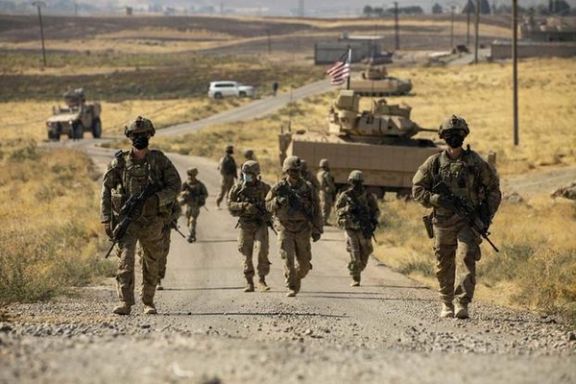
The US military says one of its bases in eastern Syria was targeted by a rocket attack on Monday.

The US military says one of its bases in eastern Syria was targeted by a rocket attack on Monday.
In a statement, the military announced a rocket hit the Mission Support Site Conoco, the US oil company in eastern Syria, and another rocket was found at the attack point of origin, but they did not cause any casualties or damage.
No group has yet claimed responsibility for the attack. However, The Britain-based Syrian Observatory for Human Rights that monitors human rights in Syria suggested Iranian-backed militias may have been behind the attack.
The US forces targeted the positions of groups related to the Islamic Revolutionary Guard Corps in Syria with retaliatory airstrikes in late March.
The operation was a response to a suspected Iran-linked drone attack that killed a US contractor and wounded six other Americans in northeastern Syria.
Estimates show that currently, at least 900 US forces are present in Syria.
In late March, top US defense chiefs faced criticism from the Senate Armed Forces Committee claiming the response to Iranian attacks on US forces is weak and lacks deterrence.
Of 83 attacks in Iraq and Syria since President Joe Biden took office, just four retaliations have taken place.
The weak US approach to Iran has been a thorn in Biden’s side as the Democrats try to keep channels open with Tehran in the hope of reviving the nuclear deal, the JCPOA.
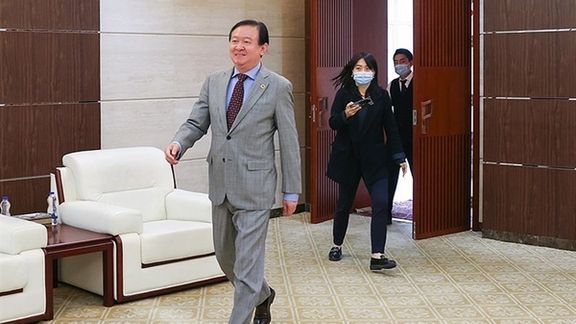
China's ambassador in Iran says Beijing’s mediation between Iran and Saudi Arabia stems from it desire to solve global security issues, not self interest.
In an exclusive interview published Monday by Tasnim news agency, affiliated with the Revolutionary Guards, Ambassador Chang Hua spoke about the reestablishment of relations between Iran and Saudi Arabia, the US troops in the region, and prospects of ditching the dollar in bilateral transactions among other things.
No Chinese media or Iranian media released a transcript of the interview, therefore Iran International cannot independently verify the readout published by the IRGC outlet.
Throughout the interview, Chang used every opportunity to gloat over Beijing’s role in the rapprochement between the arch-rivals, the Islamic Republic and the Al Saud and also reiterating that the US is in decline.
The long-term strategy for long-term peace and stability in the world is to take a new security path with dialogue instead of confrontation, and a win-win policy instead of a zero-sum strategy, the Chines diplomat said.

The talks between Iran and Saudi Arabia in Beijing have provided new examples and ideas for solving global security issues, he was quoted as saying, promising that China will continue to do its best to provide necessary support to Iran and Saudi Arabia and help promote security and stability in the Middle East.
The United States and Western countries make the best use of their hegemony of public opinion, and manipulate contentious issues through deceptive propaganda, he said, claiming that continuous interventions in the Middle East is their tactic to maintain their hegemony.
Chang said that “the Beijing agreement between Iran and Saudi Arabia” was welcomed by the international community but Washington accused China of “entering the Middle East for energy,” which show the evil intentions of the US. “Foreign interference is an important factor that weakens the security and stability of the Middle East... The US has committed serious human rights violations and many other crimes in the region, which has caused permanent and irreparable damage to the countries and people of the region,” Tasnim quoted Chang as saying.
He also urged the international community, especially influential countries outside the region, to respect the sovereignty of the countries of the Middle East and not to interfere in their internal affairs.
“As a good friend of the Middle East countries, China has no personal interest in the region, and has always been committed to the settlement of hot political issues,” he claimed, according to Tasnim.
Following the China-brokered deal to restore ties, the foreign ministers of Iran and Saudi Arabia met in Beijing for the first formal meeting in more than seven years on April 6. After years of hostility that fueled conflicts across the Middle East, Tehran and Riyadh agreed to end their diplomatic rift and re-open embassies in a major deal facilitated by China last month.
Critics in the US have blamed the Biden Administration for pushing Saudi Arabia toward China by pursuing the restoration of the 2015 nuclear deal with Tehran and losing the trust of Saudi leaders, as the great power in the region. The US believes China has a role to play in telling Iran to end its “destabilizing activities,” the State Department said as Iran’s president visited Beijing in mid-February.
However, as Iran moves closer to Russia and China, leading Iranian lawmakers and pundits have warned the government against over-reliance on Moscow and Beijing.
Earlier in the month, a moderate Iranian news website claimed that the Islamic Republic’s frozen assets in China are worth between $22 and $30 billion, suggesting that amid US sanctions even Tehran’s close ally is not willing to pay back its debts.
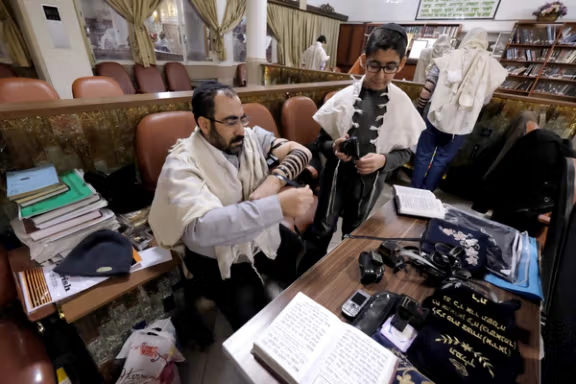
As part of restrictions against religious minorities in Iran, its Jewish community is being pressured to participate in Quds Day.
The reports in Israeli media say the community of roughly 10-15,000, once numbering in the hundreds of thousands, say pressure has been exerted to show support for Palestine, an annual phenomena.
The Jerusalem Post claims Iran’s Jewish leaders announced on Monday through its Telegram group: “Please do not go for picnics or enjoyable activities on al-Quds Day.”
However, the Jewish holiday of Passover coincides with Quds Day on Friday, and Beni Sabti, an Iranian born expert at the Jerusalem Institute for Strategy and Security, told The Jerusalem Post: “There is a silent pressure and everyone knows their role in this regime and the regime won’t hurt you” if you demonstrate in the al-Quds Day march.
The founder of the Islamic Republic of Iran, Ayatollah Khomeini named the last Friday of the month of Ramadan as Quds Day in 1979 to hold a demonstration against Israel.
In the early days of the uprising of the Iranians against the Islamic regime, the leaders of the Jewish community of Iran demanded that the members of this community not participate in the protests and in an unprecedented move, asked them not to come to the synagogues to participate in religious ceremonies for fear of retribution.
In December last year, Iran International reported in an exclusive report that the Islamic Republic has put pressure on religious minorities to force them to condemn the uprising of the Iranian people following the death in custody of Mahsa Amini.
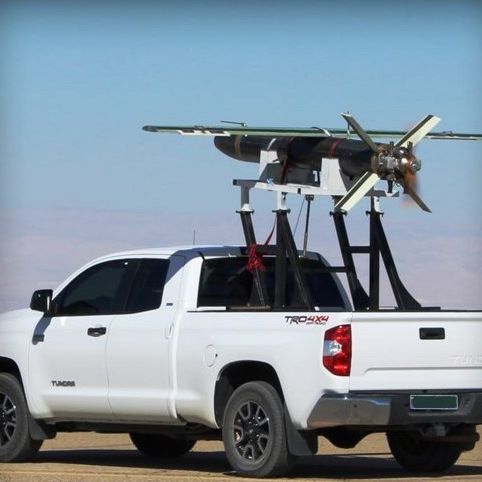
Iran’s Revolutionary Guard Corps has claimed it has developed its latest suicide drone as the regime steps up military drone production.
Known as the Meraj 532, it will be used by the IRGC ground force with a one-way range of 450km.
Spokesperson Ali Kouhestani said the easy-setup drone can fly up to a height of 12,000 feet for 3 hours after taking off from a vehicle, adding that with its 50 kg warhead, it has high accuracy.
He boasted that domestic production of drones is progressing at a good speed, and in the near future, other combat, training and suicide drones will be unveiled.
There is no independent confirmation of the suicide drone’s production.
Iran’s provision of drones to Russia in its war against Ukraine - a claim it denies - has led to a host of new sanctions on the republic from countries including the US and Australia, and the European Union.
Drones have also become a key weapon for Iran’s proxies in the region, not least, the Houthis in Yemen, which have used drone attacks not only on domestic targets but further afield against Saudi Arabia and the United Arab Emirates.
Though Iranian officials are known to make claims about military capabilities that cannot be independently verified, the US based Analysts at the Defense Intelligence Agency outlined how Iran had turned from being a regional drone player in the Middle East to becoming Moscow’s most significant military backer in the war.
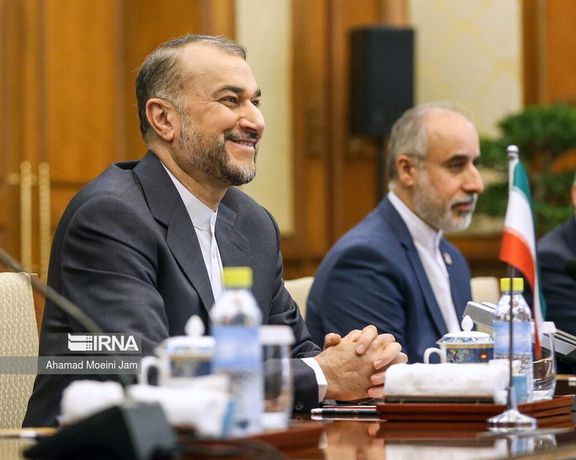
Crisis talks between Baku and Tehran have continued over the weekend in a bid to reduce rising tensions between the two nations.
Foreign Minister Hossein Amir-Abdollahian told his counterpart Jeyhun Bayramov of the “necessity of Islamic solidarity between Iran and Azerbaijan against Israel”, Iran’s nemesis.
The two had frank discussions about what the state news agency, IRNA, termed the “existing misunderstandings” as both sides urged de-escalation.
It has been a tense few months between the two states. Iran angrily reacted to Azerbaijan’s opening an embassy in Tel Aviv in March, in addition to relations souring following an armed attack on Azerbaijan’s embassy in Tehran in January.
Just last week, Azerbaijan expelled four Iranian diplomats over “provocative actions” which have yet to become clear, with Iran promising to do the same in return. Six Azerbaijanis were arrested hours earlier accused of a Shi’ite coup plot, believed to have been led by Tehran.
This weekend, the spokesperson of the Ministry of Foreign Affairs of Azerbaijan, Aykhan Hajizada, rebutted the pressure from Tehran, asserting that Islamic solidarity does not mean interfering in the internal affairs of other countries nor supporting the occupation of Muslim countries' lands.
In a bid to drive a wedge between Azerbaijan and Israel, the spokesman of Iran's Foreign Ministry, Nasser Kanaani, called on Azerbaijan to show Islamic solidarity against Israel and the recent events in Al-Aqsa Mosque.
Refusing to take the bait, Hajizada highlighted what it sees as Iranian hypocrisy: "The claim of Islamic solidarity by Iran comes as it did not protest against the occupation of the lands of the Republic of Azerbaijan by Armenia for 30 years."
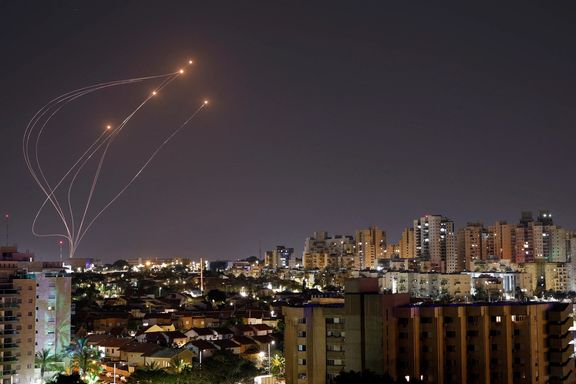
Chaos at the hands of Iran’s allies and proxies rippled across the region this weekend, with its effects felt from Israel to the US with Israel blaming Tehran.
Last Thursday saw the worst rocket attacks launched on Israel from Lebanon’s south in the most intense flare-up since 2006, at the same time as rocket attacks were being launched from Hamas-controlled Gaza in Israel’s south.
On Saturday night, that front extended to Syria, where rockets were fired into the Golan Heights. In both cases, Israel has strategically but moderately responded, attacking the likes of rocket launchers, radar and artillery positions in the wake of the attacks.
The turbulence continued after the announcement that the US Navy has deployed a guided-missile submarine capable of carrying up to 154 Tomahawk missiles to the Middle East in a show of force toward Iran following recent tensions. Just last month the US launched airstrikes against Iran-backed forces in Syria after a rocket attack killed a US contractor and wounded seven other Americans in that country’s northeast.
The latest deployment is believed to follow the uncovering of a plot by Iran’s Revolutionary Guards Aerospace Force which was preparing a drone attack against Israeli-owned civilian merchant vessels sailing in the Persian Gulf and the Arabian Sea, according to a report in The New York Times.
In a rare acknowledgment of the location and deployment of submarines, Commander Timothy Hawkins, a spokesman for the 5th Fleet based in Bahrain, said it can carry up to 154 Tomahawk land-attack cruise missiles and is deployed to US 5th Fleet “to help ensure regional maritime security and stability”.
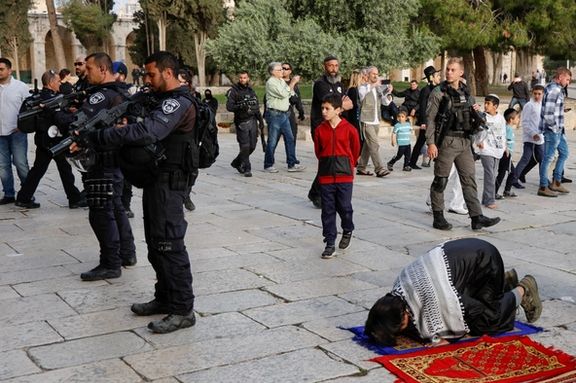
]The 5th Fleet patrols the crucial Strait of Hormuz, the narrow mouth of the Persian Gulf through which 20% of all oil transits. Its region includes the Bab el-Mandeb Strait off Yemen and the Red Sea stretching up to the Suez Canal, the Egyptian waterway linking the Mideast to the Mediterranean Sea.
The US, UK and Israel have accused Iran of targeting oil tankers and commercial ships in recent years, allegations denied by Tehran. The US Navy has also reported a series of tense encounters at sea with Iranian forces that it said were being recklessly aggressive.
And now, many are waiting to see what Israel’s bigger response will be to the attacks from Lebanon, which at minimum, have the tacit approval of Hezbollah which controls the area, but no doubt, has the blessing of Tehran.
So far, Israel has cautiously attributed blame to Palestinian factions in Lebanon, compounded by the fact Hamas’ political chief, Ismail Haniyeh, had met with Hezbollah leader Hassan Nasrallah on the eve of the rocket barrage.
The Israel Defense Forces’ spokesman alluded to the fact that investigations into Iranian involvement were underway in a press briefing Thursday but this weekend, Israel’s Minister of Defense Yoav Gallant spoke with his US counterpart, Secretary of Defense Lloyd Austin, and for the first time, claimed the attacks from both Gaza and Lebanon, were done "with the backing of Iran”.
While Hamas continues its campaign of chaos, the prospects for calm look slim. Carefully orchestrated riots inside the world’s third holiest Muslim site, Al Aqsa Mosque in Jerusalem, provoke often violent responses from Israel Police, appointed to safeguard freedom of worship.
Images of masked rioters in physical confrontations with police inside the mosque continue to stir the hatred and fuel Iran’s strategy for weakening Israel’s image in the public eye.
The Iranian regime’s media is boasting of its proxies destabilizing Israel and intimidating “the Zionists”.
On Sunday, Mohammad Baqer Qalibaf, speaker of Islamic Republic’s parliament, spoke in the public session of the legislative body and called Israeli retaliation “barbaric attacks”.
He left little to the imagination about the regime’s future plans. The multi-faceted war against Israel continues unabated. He warned: “The Zionist regime is in its weakest state in history and knows that a harsh and crushing punishment awaits them.”